(dog daze turner print does not keep original ending card but i heard there are two since ending for the one commonly known does not have borders) |
No edit summary |
||
| Line 1: | Line 1: | ||
{{Unreferenced|September 2017}} |
{{Unreferenced|September 2017}} |
||
[[File:19.jpg|300px|thumb|dubbed card for many pre-1948 cartoons not crediting Schlesinger]] |
[[File:19.jpg|300px|thumb|dubbed card for many pre-1948 cartoons not crediting Schlesinger]] |
||
| − | Warner Bros. has also had controversy over Turner Entertainment's "'''dubbed version'''" prints, used on every pre-1948 cartoon in circulation beginning in 1995 |
+ | Warner Bros. has also had controversy over Turner Entertainment's "'''dubbed version'''" prints, used on every pre-1948 cartoon in circulation beginning in 1995. |
In addition to the 1995 Turner prints, Warner Bros. created new transfers from 1997-98 featuring select cartoons, labeling them as "THIS VERSION". All these are released on European VHS. Some of them are even featured on several of the DVD releases, without the dubbed notice. |
In addition to the 1995 Turner prints, Warner Bros. created new transfers from 1997-98 featuring select cartoons, labeling them as "THIS VERSION". All these are released on European VHS. Some of them are even featured on several of the DVD releases, without the dubbed notice. |
||
Revision as of 07:34, 10 November 2019
|
Stamped on September 2017. This article or section does not cite any sources. Please add reliable citations to help verify the article's content. Do not remove this template until all conditions have been met. |
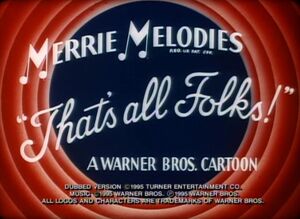
dubbed card for many pre-1948 cartoons not crediting Schlesinger
Warner Bros. has also had controversy over Turner Entertainment's "dubbed version" prints, used on every pre-1948 cartoon in circulation beginning in 1995.
In addition to the 1995 Turner prints, Warner Bros. created new transfers from 1997-98 featuring select cartoons, labeling them as "THIS VERSION". All these are released on European VHS. Some of them are even featured on several of the DVD releases, without the dubbed notice.
These "dubbed versions", which continue to be shown on cable and broadcast television to this day, are not representative of the original theatrical release versions of the Looney Tunes and Merrie Melodies shorts. Despite Warner Bros./Turner's best efforts to include the best available versions of the shorts possible on classic film DVDs, several "dubbed version" cartoons have been released on DVD as bonus features, either in special 2-disc editions of the WB/Turner classic films or on The Golden Age of Looney Tunes Volume 5 LaserDisc, if no better version does exist or is undiscovered. The ones released on the Golden Collection are bonuses as well, although some post-1948 versions are restored.
1995
These versions were actually new ones derived (hence the "dubbed" moniker) from earlier-generation prints of whatever versions of shorts were available in the Turner vaults at the time, even if they were the altered "blue ribbon" prints or oldest a.a.p. prints. These prints were created to restore quality in the cartoons to make them more marketable for the modern television era.
These dubbed version transfers, unlike the older transfers preceding them (such as the oldest a.a.p. prints, Cartoon Festivals tape prints and Cartoon Moviestars VHS/Laserdisc prints), in terms of aspect ratio they have the picture displayed in full wide and enlarged views, as opposed to the cropped "pan-and-scan" screen method used in the older transfers preceding them. Very often, despite the enlarged picture, the 1995 dubbed versions rarely-to-never show any visible frames at any part of the edges of the screen from start to end, unlike the oldest a.a.p. prints preceding them. This is perhaps because when the 1995 dubbed versions were created, the 16mm duplicate film negatives (based on what was available in the Turner vaults at the time) were re-scanned, and modern film scanning technology of the 1990s had enabled more picture exposure than previous film scanning technology. "Yankee Doodle Daffy", "Daffy Duck in Hollywood", "Rhapsody in Rivets" and "Page Miss Glory" are among the 1995 dubbed version prints that benefited this full wide viewing advantage.
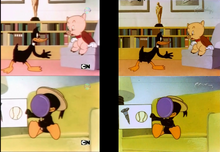
A comparison image depicting how 1995 dubbed version prints (right) show more picture than their previous old a.a.p. prints (left), with Yankee Doodle Daffy (1943) being a good example of this.
Some cartoons air as prototype-Turner dubbed versions on European Turner networks, with most of them airing on Cartoon Network and Boomerang in the United Kingdom. Prototype-Turner prints have the same color corrections as the official dubbed versions, but do not have the dubbed ending card or altered ending music cue rather, they have the regular end card and the original ending music cue intact. Examples include "Two Gophers from Texas" (with part of the a.a.p. opening music intact), "Scent-imental over You" (with part of the a.a.p. opening music intact), "Along Came Daffy" and "Odor-able Kitty".
Some cartoons that portray stereotypes of black people or cartoons that feature WW2 propaganda like "The Early Worm Gets the Bird", "Flop Goes the Weasel", "Plane Daffy", "Herr Meets Hare", and the first four Inki cartoons are known to have American dubbed versions, but these versions were never aired on the Turner Entertainment networks. However, they are known to have European dubbed versions.

Sceenshot captured from the rare prototype-Turner dubbed version print of "Scent-imental over You" (1947) which keeps its original ending card (or its original Blue Ribbon ending card, for this case)
While the Metro-Goldwyn-Mayer 1987 prints sometimes got rid of the opening, and while Turner did edit the ending cards, Turner never omitted the cartoon's opening titles. Two cartoons had their opening restored from Blue Ribbon reissues, such as "Hiawatha's Rabbit Hunt" and "Hop, Look and Listen". "Bars and Stripes Forever" had its original opening title restored, its original production code was hacked upon the copyright being sold to Associated Artists Productions and was replaced with the "Gold Rush Daze" opening title. "The Bear's Tale" had its Blue Ribbon reissue title restored, which was hacked off when its copyright were sold. Also, "Pop Goes Your Heart" had its original opening titles restored, which was hacked off when its copyright were sold. All three of these however, had their original ending titles hacked off in return. In addition, "A Hick a Slick and a Chick", which had lost its "That's all, Folks!" ending card from the a.a.p. print at some point, has its "That's all, Folks!" ending card and original ending soundtrack restored in the Turner dubbed version, though its 'new' "That's all, Folks!" ending card was taken from another source and had the Turner "Dubbed" notice.[1]
These "dubbed versions" had many alterations. Most always kept their original opening cards, except "Daffy Duck & Egghead" and "The Night Watchman", but some of the cartoons had red, purple, green, or other color borders in the opening titles.
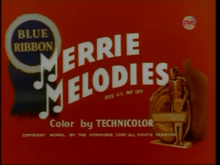
Recreated Merrie Melodies opening card seen only on the Turner dubbed version prints of "Daffy Duck & Egghead" (1938) and "The Night Watchman" (1938), replacing these shorts' respective Blue Ribbon Merrie Melodies opening cards
Title Alterations
- 1931-1933 Harman-Ising MM - These cartoons kept their original ending card, but with dubbed notice attached.
- 1934-1935 Color MM - These cartoons had the Jester end card, with their original audio, with dubbed notice attached. If the cartoon was released between "Honeymoon Hotel" and "I Wanna Play House", but was not given a Blue Ribbon reissue, the Jester sign off from 1935 ("My Green Fedora") was present but the original audio still played.
- 1936-1944 Color MM, or Blue Ribbons, crediting Schlesinger - These cartoons had the 1938 ending card, with dubbed notice attached. The 1938 ending cards have slightly different color corrections for the American and European dubbed prints. The American dubbed card has a reddish color tint while the European dubbed card has a more golden color tint. "Released by Warner Bros. Productions Corp." is digitally removed. The 1938 ending card was sourced from "September in the Rain". There were exceptions to this rule, see below.
- 1935-1948 Color MM, or Blue Ribbons, crediting Warner Bros. - These cartoons had the 1948 ending card, with dubbed notice attached. The 1948 end cards had slight color corrections and different font corrections, see below. The 1948 ending card was sourced from "Bugs Bunny Rides Again". There were exceptions to this rule, see below.
- 1943-1944 Color LT - These cartoons had a generic drum ending card with red borders and dubbed notice attached. "Released by Warner Bros. Pictures Inc." is digitally removed. It is unknown which cartoon this was sourced from.
- 1944-1946, Color LT - These cartoons had a generic drum ending card with red borders and dubbed notice attached. It is unknown which cartoon this was sourced from.
- 1946-1948 Color LT - These cartoons had the 1948 ending card, with dubbed notice attached. The 1948 end cards had slight color corrections and different font corrections, see below. The 1948 ending card was sourced from "Haredevil Hare".
- Dubbed versions with the cartoons re-released in the 1952-53 season would have THE END replaced with the 1947-48 dubbed card.
- Two cartoons, "Good Night Elmer" and "Peck Up Your Troubles", have their original ending cards intact on both American and European dubbed versions because they don't have any dialogue. However, a few other cartoons that don't have any dialogue still got the Turner "dubbed" ending cards.
The "dubbed" prints also had a disclaiming copyright to Turner, and Warner Bros., thus replacing the original end card or original Blue Ribbon end card, although a few dubbed version cartoons such as "Good Night Elmer" and "Peck Up Your Troubles" do not have altered end cards for either the American or European dubbed because the cartoons don't have any dialogue. The dubbed disclaimer seen on almost all dubbed version prints whose copyrights are owned by Turner Entertainment are as follows: DUBBED VERSION (C) 1995 TURNER ENTERTAINMENT CO. MUSIC (C) 1995 WARNER BROS. (P) WARNER BROS. ALL LOGOS AND CHARACTERS ARE TRADEMARKS OF WARNER BROS.
Some of the European dubbed versions had the ending card opposite of which producer was credited in the opening titles, such as "I Only Have Eyes for You", "A Feud There Was", "Hobo Gadget Band", and "Fox Pop" having the 1938 card instead of the 1948 card. Other European dubbed versions had the opposite effect, such as "I Love to Singa", "Count Me Out", "Dog Daze" and "The Heckling Hare" having the 1948 card instead of the 1938 card, the first and the latter had its ending restored for its DVD release. In addition, the American dubbed transfer of "Tortoise Wins by a Hare" has the 1948 end card instead of the 1938 one. "Baseball Bugs"' European Turner print replaces the special Bugs drum ending with a "Produced by Leon Schlesinger" drum ending card.
Some cartoons after 1935 such as "Baseball Bugs"'s American Turner print copies, "The Cat Came Back", "Snowtime for Comedy", The Fifth-Column Mouse, "The Old Grey Hare", and "The Bird Came C.O.D."'s European Turner print copies, kept their original ending cards, but their counterparts do not.
Aside from the transfer color change and title alterations, the soundtracks (especially the English Audio Track) in the 1995 dubbed versions have been partially remastered and restored, resulting to better sound quality than their previous a.a.p. counterparts. "Back Alley Oproar", "The Penguin Parade", "Birdy and the Beast" and "What's Cookin' Doc?" are among examples of 1995 dubbed version prints that benefited with better quality soundtracks in comparison to their older a.a.p. transfers preceding them.
The 1995 dubbed version foreign language dub soundtracks contain altered music cues taken from other Looney Tunes cartoons (particularly from the post-1948 shorts produced within the 1950s) and sometimes replaced sound effects from Warner Bros.' sound archives due to the pre-1948 Looney Tunes shorts lacking their original music-and-effects track for foreign dubs, hence why the dubbed disclaimer seen at the end of the altered ending cards credits the copyright notices MUSIC (C) 1995 WARNER BROS. (P) 1995 WARNER BROS. Sometimes the original ending track has been changed for some 1995 dubbed version prints (see 'Controversy' for more details).
Controversy
Many animation fans have believed that changing the end card was a bad move on many of the pre-1948 cartoons, especially "The Old Grey Hare". Because of the generic end card, the shaking ending card gag was not present in the USA dubbed version, though the explosion was still heard. However, in the European dubbed version, the original end card shakes, and the Turner disclaimer fades up at the end.
Due to the release of The Golden Age of Looney Tunes, Volume 5 LaserDisc in 1997, all cartoons but two on this set are all American Turner "dubbed" prints and some of them are now completely shorn of their original ending cards. Though some have been found, others remain this way.
In almost all cases, the original ending music was kept, although sometimes, an earlier or later version of the closing theme is heard on the titles (some reissued Looney Tunes had their ending music changed to that of the Merrie Melodies series). In addition, some European and American foreign tracks have different ending music, but their English American/European counterparts, respectively, do not.

Differences, EU dubbed on the left, USA on the right

Differences, EU dubbed on the left, USA on the right
1997-1998
In 1997 and 1998, Warner Bros. began to restore selected post-1948 cartoons, with a similar dubbed card. These transfers are fully restored and remastered for for the first time for home media releases. Unlike the 1995 Turner dubbed versions, these are derived from the original negatives, keep the original ending Color Rings, except "Kit for Cat", and use "THIS VERSION" instead of "DUBBED VERSION" dubbed disclaimer. These prints exist both with, for the VHS releases starting in 1997 and without the disclaimer, for the DVD releases starting in 2003. A few of these 1997-98 "THIS VERSION" prints are present on the Looney Tunes Golden Collection, Volume 1, Looney Tunes Super Stars, and the Looney Tunes Mouse Chronicles: The Chuck Jones Collection DVD sets, without the disclaimer. However, these prints were only restored for standard definition, hence, some had to be restored again for high definition release on the Looney Tunes Platinum Collection, although only one 1998 "THIS VERSION" print was included in standard definition on the first volume of Platinum Collection as a special feature.
While their NTSC versions (which are often rare in availability) present the "THIS VERSION" prints in normal-pitched audio and NTSC playback speed, their PAL versions however for some reason present the "THIS VERSION" prints in normal-pitched audio instead of high-pitched audio despite playing at PAL playback speed.
These prints were first released on some European VHS tapes, and even showed up on the Turner networks as well (usually aired overseas). VCD (Video CD) versions of these tapes are said to exist in some countries outside the United States.
VHS releases containing THIS VERSION 1997 prints
These are the first "THIS VERSION" prints created by Warner Bros. in 1997. The VHS tapes here are released in Europe and are not available in the United States. The contents in these tapes are the same as the Bugs and Friends Japanese LaserDisc set. All dubbed prints here exist uncut except "Duck Dodgers and the Return of the 24 1/2th Century" which uses ABC's edited-for-TV short version. The 1997 prints, however, are of lower quality than the prints released in 1998, as this could be due to the film restoration technology being fairly new at the time.
Each tape (hence the Bugs and Friends name) consists of a selection of Bugs Bunny cartoons (covering mostly through the 1950s till 1964) and a selection cartoons featuring Daffy Duck, Speedy Gonzales, Road Runner, Tweety and Marvin the Martian, depending on the tape. Unlike the THIS VERSION 1998 print compilations which succeed this Bugs and Friends tapes, a small selection of the lesser-known Depatie-Freleng era cartoons of the mid-1960s were given THIS VERSION 1997 WB dubbed prints.
Each tape in this series began with a short version of the "Warner Bros. Family Entertainment" logo as seen on Warner Bros. Animation's cartoon shows (albeit with a short Merrie Melodies fanfare).
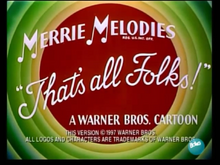
THIS VERSION (C) 1997 WARNER BROS. dubbed disclaimer on the original ending card, seen on 1997 dubbed version prints. Taken from "Catty Cornered" (1953).
1. Bugs and Daffy: What's Up, Duck?
- "The Abominable Snow Rabbit"
- "Suppressed Duck"
- "The Million Hare"
- "The Iceman Ducketh"
- "Bugs and Thugs"
- "Daffy's Inn Trouble"
2. Bugs and Tweety: Watch The Birdie
3. Bugs and Road Runner: Runaway Rabbit
- "Lighter Than Hare"
- "Highway Runnery"
- "The Unmentionables"
- "Run, Run, Sweet Road Runner"
- "Big Top Bunny"
- "Beep Prepared"
4. Bugs and Speedy: Hare Today, Gone Tomorrow
5. Bugs and Marvin: Martian Mayhem
(NOTE: "Duck Dodgers and the Return of the 24½th Century" is presented as an edited-for-TV version, hence all copies of the cartoon only exist edited)
- "Napoleon Bunny-Part"
- "Duck Dodgers and the Return of the 24½th Century"
- "Hyde and Hare"
- "From Hare to Heir"
- "Mad as a Mars Hare"
- "Bonanza Bunny"
VHS releases containing THIS VERSION 1998 prints: First batch
These are the second "THIS VERSION" version prints created by Warner Bros. in 1998. The VHS tapes here are released in Europe and are not available in the United States. All dubbed prints here exist uncut except "Wideo Wabbit".
Five tapes were released in this batch. The first four tapes were mainly dedicated to characters Bugs Bunny ("From Hare To Eternity"), Daffy Duck ("Superior Duck"), Tweety & Sylvester ("Greedy for Tweety") and Elmer Fudd ("Wideo Wabbit") respectively. The last tape of the batch ("Cheese Chasers") is mainly dedicated to the minor characters.
Each tape in this series began with a short version of the "Warner Bros. Family Entertainment" logo as seen on Warner Bros. Animation's cartoon shows (albeit with a short Merrie Melodies fanfare), except for "From Hare To Eternity" and "Superior Duck" VHS tapes, as both tapes use complete theatrical prints of their respective titular shorts which contained Warner Bros. Family Entertainment theatrical opening logos intact as the first cartoons in each tape).
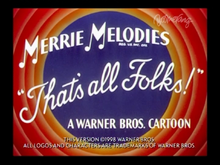
THIS VERSION (C) 1998 WARNER BROS. dubbed disclaimer on the original ending card, seen on this batch of 1998 dubbed version prints. Taken from "Muzzle Tough" (1954).
1. From Hare to Eternity
- "From Hare to Eternity"
- "High Diving Hare"
- "Bully for Bugs"
- "Rabbit Fire"
- "My Bunny Lies over the Sea"
- "Ballot Box Bunny"
2. Superior Duck
- "Superior Duck"
- "The Stupor Salesman"
- "Design for Leaving"
- "Golden Yeggs"
- "Stork Naked"
- "Show Biz Bugs"
3. Greedy for Tweety
- "Greedy for Tweety"
- "Tweety's Circus"
- "Tweety's S.O.S."
- "A Street Cat Named Sylvester"
- "Bad Ol' Putty Tat"
- "Muzzle Tough"
4. Wideo Wabbit
NOTES: The 1998 "THIS VERSION" master copy of "Wideo Wabbit" is censored to remove all references of "You Beat Your Wife" in one scene. "Kit for Cat" has its original opening and ending titles restored for the The 1998 "THIS VERSION". The newer 2003 restoration on the Looney Tunes Golden Collection Volume 1 DVD also restores the original opening titles, but for reasons unknown, keeps the Blue Ribbon ending.
- "Wideo Wabbit" (censored)
- "A Star Is Bored"
- "Robot Rabbit"
- "Ant Pasted"
- "This Is a Life?"
- "Kit for Cat"
5. Cheese Chasers
VHS releases containing THIS VERSION 1998 prints: Second batch
These are the third "THIS VERSION" prints created by Warner Bros. in 1998. These batch of tapes are also known as the "Looney Tunes 2000" series. The VHS tapes here are released in Europe and are not available in the United States. All dubbed prints here exist uncut.
Five tapes were released in this batch. The first four tapes were mainly dedicated to characters Porky Pig ("The Prize Pest"), Foghorn Leghorn ("A Fractured Leghorn"), Bugs Bunny ("Big House Bunny") and Sylvester ("Scaredy Cat") respectively. The last tape of the batch ("Feed the Kitty") is mainly dedicated to the minor characters.
Each tape in this series began with a short version of the "Warner Bros. Family Entertainment" logo as seen on Warner Bros. Animation's cartoon shows (albeit with a short Merrie Melodies fanfare).

THIS VERSION (C) 1998 WARNER BROS. dubbed disclaimer on the original ending card, seen on this batch of 1998 dubbed version prints. Note that this second batch has a different font used for the dubbed disclaimer. Taken from "Don't Give Up the Sheep" (1953).
1. The Prize Pest
- "Dime to Retire"
- "The Wearing of the Grin"
- "The Ducksters"
- "Dough for the Do-Do"
- "Deduce, You Say"
- "The Prize Pest"
2. A Fractured Leghorn
(NOTE: "The Foghorn Leghorn" has its original titles restored for the 1998 "THIS VERSION".)
- "Lovelorn Leghorn"
- "The Foghorn Leghorn"
- "Of Rice and Hen"
- "A Broken Leghorn"
- "Strangled Eggs"
- "A Fractured Leghorn"
3. Big House Bunny
- "Water, Water Every Hare"
- "Big House Bunny"
- "Hare Trimmed"
- "Rabbit Seasoning"
- "Bunker Hill Bunny"
- "Baton Bunny"
4. Scaredy Cat
(NOTE: "Scaredy Cat" has its original titles restored for the 1998 "THIS VERSION".)
- "Canned Feud"
- "A Mouse Divided"
- "Scaredy Cat"
- "Mouse Mazurka"
- "Stooge for a Mouse"
- "Little Red Rodent Hood"
5. Feed the Kitty
- "Chow Hound"
- "Lumber Jerks"
- "Boyhood Daze"
- "Feed the Kitty"
- "Don't Give Up the Sheep"
- "The Hypo-Chondri-Cat"
1997-98 Dubbed Versions on DVD
Some of these 1997-98 transfers show up on official Warner Home Video DVDs. They have the same color corrections and some have their audio taken from the 1997-98 remastered audio, but do not have the dubbed notice at the end.
These are only available in standard definition, so some of them had to be restored again in high definition for the Looney Tunes Platinum Collection Blu-Rays.
- "The Foghorn Leghorn" (LTGC: Vol 1)
- "Scaredy Cat" (LTGC: Vol 1)
- "Ant Pasted" (LTSS: HH, with the cue mark)
- "The Wearing of the Grin" (LTGC: Vol 1)
- "The Ducksters" (LTGC: Vol 1)
- "Deduce, You Say" (LTGC: Vol 1)
- "Dough for the Do-Do" (LTGC: Vol 1)
- "A Broken Leghorn" (LTGC: Vol 1)
- "Canned Feud" (LTGC: Vol 1)
- "Bunker Hill Bunny" (LTGC: Vol 1)
- "Baton Bunny" (LTGC: Vol 1)
- "Water, Water Every Hare" (LTGC: Vol 1)
- "Big House Bunny" (LTGC: Vol 1)
- "Rabbit Seasoning" (LTGC: Vol 1)
- "Mouse Mazurka" (LTMC)
- "Lumber Jerks" (LTGC: Vol 1)
- "Feed the Kitty" (LTGC: Vol 1)
- "The Hypo-Chondri Cat" (LTGC: Vol 1)
- "Boyhood Daze" (LTGC: Vol 6)
- "Don't Give Up the Sheep" (LTGC: Vol 1)
- "I Gopher You" (His Majesty O'Keef)
- "Beep Prepared" (Splendor in the Grass)
- "From Hare to Eternity" (LTPC: Vol 1 - with 1998 Dubbed Version notice)
1997-98 Dubbed Versions on Television
While only a few WB 1997/1998 dubbed versions were aired on the USA Turner networks (such as "Don't Give Up the Sheep", "The Wearing of the Grin", "Wideo Wabbit", "Dog Pounded", "Dough for the Do-Do", "A Mouse Divided", "Big House Bunny", "Greedy For Tweety", "From Hare to Eternity", Shishkabugs", "The Million Hare", "Daffy's Inn Trouble", "Bugs and Thugs" and "Robot Rabbit"), most of these dubbed versions are currently aired on Cartoon Network overseas, and even turned up on a selection of European VHS tapes. Most prints that are currently aired on Boomerang USA come from the LaserDiscs or the Warner Bros. Cartoons Golden Jubilee 24 Karat Collection VHS.
Although only a few WB 1997/1998 dubbed versions were aired on Cartoon Network in the USA, Cartoon Network Latin America airs a slightly larger selection of 1997/1998 dubbed versions than the USA counterpart. Examples of post-1948 1997/1998 dubbed prints CN Latin America airs which CN USA doesn't air: "The Unmentionables", "From Hare to Heir", "Lighter Than Hare", "Foxy by Proxy", "The Iceman Ducketh", "Little Red Rodent Hood", "Mouse Mazurka", "Rabbit Seasoning", "Deduce, You Say", "Cheese Chasers", "Napoleon Bunny-Part" and "Assault and Peppered".
Most free-to-air channels over in Europe, such as the Italian TV station Mediaset Italia 1, on the other hand are known to air all the 1997 and 1998 dubbed versions.

